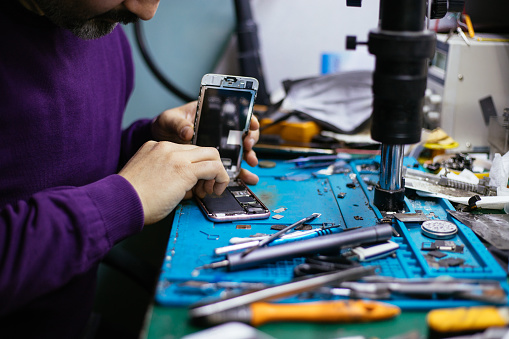
Getty Images
Apple has always had a strong preference that only its own “genuine” parts be used in repairs, but only if they’re brand-new. Now, soon after Oregon passed a repair bill forbidding devices from rejecting parts with software locks, or “parts pairing,” Apple says it will allow for used Apple parts in iPhone repairs.
While noting that “pairing” is “critical to preserving the privacy, security, and safety of an iPhone,” Apple states that it has worked for two years to allow for reusing Face ID and Touch ID sensors (i.e. biometric sensors) as well as moving part calibration from its remote repair certification tools onto the iPhone itself. As a result, future iPhones will allow for reusing biometric sensors, and anyone ordering parts from Apple can skip sending a device’s serial number, so long as the repair doesn’t involve a new main logic board.
The new policy “is designed to maintain an iPhone user’s privacy, security, and safety, while offering consumers more options, increasing product longevity, and minimizing the environmental impact of a repair,” according to Apple’s release.
“At Apple, we’re always looking for new ways to deliver the best possible experience for our customers while reducing the impact we have on the planet, and a key part of that means designing products that last,” John Ternus, Apple’s senior vice president of hardware engineering, said in a statement. “With this latest expansion to our repair program, we’re excited to be adding even more choice and convenience for our customers, while helping to extend the life of our products and their parts.”
Apple also announced that iPhones’ Parts and Service history will be expanded to show whether each part that has been replaced is a new or used Genuine Apple part. Apple did not mention aftermarket parts but will presumably continue to label those as an “Unknown Part.”
Activation Lock and e-waste
Apple’s proclivity for parts pairing has often been linked to the company’s concerns over reuse of parts from stolen iPhones. Apple acknowledges this by announcing the addition of what it terms its “popular Activation Lock feature” to parts themselves, aiming to deter stolen iPhones from being parted out. If a device is being repaired and detects that a part came from a device that had Activation Lock or Lost Mode enabled, it won’t let that part be calibrated.
Activation Lock has long been a major hindrance to anyone working to fix, refurbish, or rework Apple devices, by design or otherwise. Activation Lock was (as Apple notes) introduced in 2013 to appease lawmakers concerned about a growing trend of smartphone theft and was then expanded to other Apple products. But a substantial number of people do not deactivate Activation Lock before selling, recycling, or sometimes simply losing their device. If an original device owner cannot be reached (or motivated) to deactivate the lock from another device, an otherwise working iPhone, iPad, MacBook, or other Apple device can end up as a paperweight.
As noted by Vice and 9to5 Mac, this extends to perfectly usable M1 MacBooks from 2020, as well as entire fleets of corporate devices traded out without Activation Lock deactivated. Repair site iFixit considered the iPhone 14 and 15 to be some of the most repairable devices Apple has made in modern times but have lowered their scores for extensive failures after genuine parts swaps. Lidar sensors, the front-facing camera, auto brightness sensors, and more fail, and other parts issue warnings.
Apple’s new middle ground of using software locks to make stolen parts far less valuable or worthless but allowing genuine parts salvaged legitimately to be calibrated and functional would seem to be an improvement over certain Apple parts refusing to work anywhere else. But Activation Lock neglect could leave discarded devices still mostly useless, even for parts.
Notable timing
PIRG, the federation of state Public Interest Research Groups, pointed to not only the Oregon repair bill, but also a similar bill in Colorado that has passed that state’s House and is due to be heard today in its Senate. “Make no mistake: The reason Apple is doing this is because Right to Repair is moving forward, thanks to the efforts of state lawmakers and our coalition of tinkers, fixers, makers and environmental and consumer advocates,” Nathan Proctor, senior director of PIRG’s right to repair campaign, said in a statement.
iFixit CEO Kyle Wiens also pinned Apple’s announcement to the Colorado bill. Wiens described Apple’s new policy as “a strategy of half-promises and unnecessarily complicated hedges” designed to deflect more laws that would ban pairing entirely. “Aftermarket parts are key to the repair ecosystem, and Apple seems keen on continuing to ban those,” Wiens wrote to Ars.
Ars has reached out to Apple for comment and will update this post with new information.
Disclosure: Kevin Purdy previously worked for iFixit. He has no financial ties to the company.




















+ There are no comments
Add yours